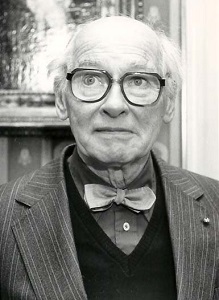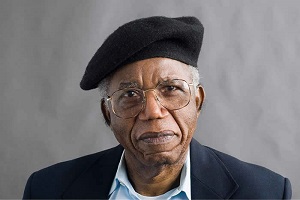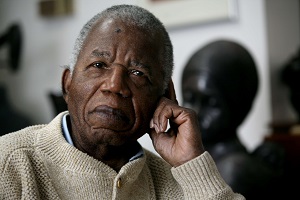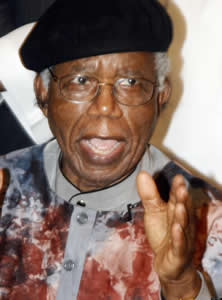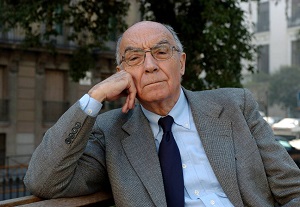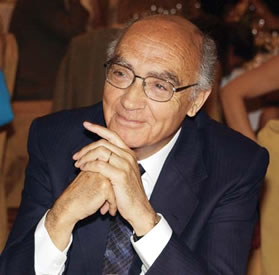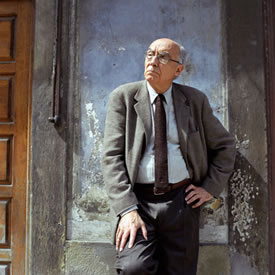De Nederlandse schrijver Anton Koolhaas werd op 16 november 1912 in Utrecht geboren. Zie ook alle tags voor Anton Koolhaas op dit blog.
Uit: Zonder Mia
“Nico en Mia heetten ze en ze hadden een tijd van dolle liefde achter de rug. Voor zover er iets vast kan staan, stond dat vast. En nu zat Mia in het nest. Een nieuw nest, maar niet erg mooi. Er lag nog geen ei in, maar toch zat ze er alvast, waarschijnlijk om te wennen. Een musseleven is overigens alleen maar wennen, want keus is er niet veel bij.
Soms, als Nico aan kwam vliegen gaf hij uit de verte al een schreeuw en dan kwam Mia van het nest en zette zich op een gering richeltje, opzij van de plank die het zonnescherm omgaf, en spreidde haar rug mooi breed. Nico nam daarop dan plaats en ze paarden zo fijn mogelijk. Vervolgens vlogen ze samen naar een boom in de tuin en deden het nog eens over, en vlak voordat Mia dan terugging naar het nest, volgde nog een herhaling op de plank boven de markies.
Als Mia dan weer onder de plank en in het nest op het zonnescherm zat, dacht ze met ontroering aan Nico. Er was niets bijzonders aan hem, niets moois, niets vaardigs, niets vermetels, maar hij deed ook niet alsof dat wel zo was.
Er zou allemaal wel niets van terechtkomen. De plaats van het nest was verkeerd. Op een gegeven ogenblik in het voorjaar zou men het zonnescherm neerlaten en daar zat dan aan vast, dat Mia met haar hele nest in de tuin zou vallen. Dat wil zeggen: op het hardstenen stuk dat de overgang vormde van het huis naar de grasmat in de tuin. Mia kon natuurlijk wegvliegen als het zover was, maar eieren kunnen niet vliegen en onbedekte, jonge vogeltjes evenmin. Het kwam nu maar aan op het moment, waarop de mensen van het huis last zouden krijgen van het zonnetje. Viel dat laat, dan kon alles nog goed gaan; kwam het vroeg, ajusies dan. Waarom dan niet een veiliger plaats opgezocht?
Mia wist natuurlijk niet zeker, dat het nest eruit geslingerd zou worden; ze wist trouwens ook niet waar een zonnescherm voor dient en hoe men daarmee handelt. Maar toch had ze van het begin af aan het gevoel, dat alles verkeerd zou lopen. Als je echter leeft naar alles wat er mis kan gaan, kan je wel ophouden. Mussen zeker!
Mia keek naar de slierten van het nest in de wind. Het was guur en voor het ogenblik zat ze er eigenlijk mooi bij. Ze speelde wel eens, dat ze de wind nakeek. Dan staarde ze eerst recht voor zich uit, tot er een flinke windvlaag kwam en dan draaide ze ineens haar kopje snel met de wind mee en keek hem na, als hij uit de slierten vandaan verder trok, de wereld in. Het is niet feestelijk om met de wind mee te gaan, als die guur is; maar het is wel bevredigend om hem na te kijken en zelf aangenaam achter te blijven in een nest onder een houten plank die het verblijfje net even donkerder maakt dan het buiten is.”
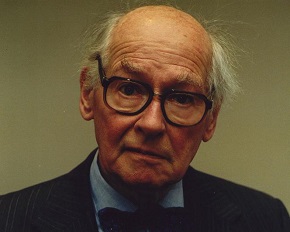
Anton Koolhaas (16 november 1912 – 16 december 1992)
De Nigeriaanse dichter en schrijver Chinua Achebe werd geboren op 16 november 1930 in Ogidi. Zie ook alle tags voor Chinua Achebe op dit blog.
Answer
I broke at last
the terror-fringed fascination
that bound my ancient gaze
to those crowding faces
of plunder and seized my
remnant life in a miracle
of decision between white-
collar hands and shook it
like a cheap watch in
my ear and threw it down
beside me on the earth floor
and rose to my feet. I
made of their shoulders
and heads bobbing up and down
a new ladder and leaned
it on their sweating flanks
and ascended till midair
my hands so new to harshness
could grapple the roughness of a prickly
day and quench the source
that fed turbulence to their
feet. I made a dramatic
descent that day landing
backways into crouching shadows
into potsherds of broken trance. I
flung open long-disused windows
and doors and saw my hut
new-sept by rainbow brooms
of sunlight become my home again
on whose trysting floor waited
my proud vibrant life.
Chinua Achebe (Ogidi, 16 november 1930)
De Portugese schrijver José Saramago werd geboren op 16 november 1922 in het dorpje Azinhaga in de provincie Ribatejo. Zie ook alle tags voor José Saramago op dit blog.
Uit: Small Memories (Vertaald door Margaret Jull Costa)
“The village is called Azinhaga and has, so to speak, been where it is since the dawn of nationhood (it had a charter as early as the thirteenth century), but nothing re-mains of that glorious ancient history except the river that passes right by it (and has done, I imagine, since the world was created) and which, as far as I know, has never changed direction, although it has overflowed its banks on innumer-able occasions. Less than half a mile from the last houses, to the south, the Almonda, for that is the name of my village’s river, meets the Tejo, which (or, if you’ll allow me, whom) it used to help, in times past and as far as its limited volume would allow, to flood the fields when the clouds unleashed the torrential winter rains, and the dams upstream, brimful and bursting, were obliged to discharge the excess of accumulated water. The land around there is flat, as smooth as the palm of your hand, with no orographic irregularities to speak of, and any dikes that were built served not so much to contain the powerful rush of the river when it floods as to guide it along a course where it would cause least dam-age. From those distant days onward, the people born and bred in my village learned how to deal with the two rivers that shaped its character, the Almonda, which slips past its feet, and the more distant Tejo, half-hidden behind the wall of poplars, ash trees and willows that accompany it, and, for good reasons and bad, both rivers are omnipresent in the memories and conversations of every family. It was here that I came into the world and it was from here, when I was not yet two years old, that my parents, migrants driven by ne-cessity, carried me off to Lisbon and to other ways of feel-ing, thinking and living, as if my having been born in the village were merely the result of some mistake made by chance, some momentary lapse on the part of destiny, a lapse for which destiny still had the power to make amends. This proved not to be the case. The child, unnoticed, had already put out tendrils and sent down roots, and there had been time for that fragile child-seed to place his tiny, un-steady feet on the muddy ground and to receive from it the indelible mark of the earth, that shifting backdrop to the vast ocean of air, of that clay, now dry, now wet, composed of vegetable and animal remains, of detritus left behind by everything and everyone, crushed and pulverized rocks, multiple, kaleidoscopic substances that passed through life and to life returned, just like the suns and the moons, times of flood and drought, cold weather and hot, wind and no wind, sorrows and joys, the living and the not.”
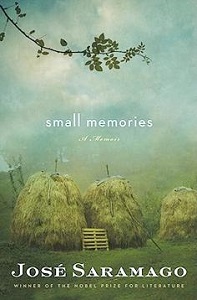
José Saramago (16 november 1922 – 18 juni 2010)
Cover
De Nederlandse schrijfster en journaliste Renate Rubinstein werd geboren op 16 november 1929 in Berlijn. Zie ook alle tags voor Renate Rubinstein op dit blog.
Uit: De expert en de mug of wie helpt wie in het onderontwikkelde
“Kort voor Kerstmis kregen we, of liever de heer A. Mus, aan wie het schrijven eigenlijk gericht was, een circulaire van de V.P.R.O. toegestuurd. We lazen: ‘Uit eerbied en bewondering voor hun werk overzee zond de V.P.R.O. in de dagen voor Kerstmis aan een aantal landgenoten bijgaande Kerstgroet…’ We keken elkaar met nieuwe ogen aan. In een omgeving waarin de meeste mensen naar ons toekomen om geld te lenen of een baan voor hun nicht te zoeken (wij maken blijkbaar de indruk beide te kunnen verschaffen), en we de anderen tegen zonsondergang ontmoeten – de auto’s geparkeerd, de kinderen in het zwembad, de kok thuis aan het electrisch fornuis – om ijsgekoelde dranken mee te drinken, in zo’n omgeving doet het goed er aan herinnerd te worden dat wij en alle landgenoten die ‘op de één of andere wijze een functie vervullen in één van de onder- of minderontwikkelde gebieden’, eerbied en bewondering waard zijn.
Wij begonnen ons af te vragen of wij misschien een offer aan het brengen waren. Daartoe was het nodig in wat globaler termen over onze positie te denken. Ons inlevend in Ds Spelberg beseften we ver van huis te zijn, ver van gezelligheid, V.P.R.O. en het vertrouwde uitzicht op regenachtige weiden vol huizen. In plaats daarvan zaten we in de tropen, vechtend zoal niet tegen het oerwoud dan toch tegen aanverwante ellende: kakkerlakken, muggen, zon en, abstracter nog, tegen armoede, onkunde en onbegrip. ‘De gevreesde muskiet tiert in de moerassen’, schreef onlangs iemand over zijn onderontwikkeld land, en het was tenslotte maar een toeval dat wij persoonlijk daar niets tegen deden. Wij zijn er meer speciaal om te vechten tegen het nationale inkomen dat te laag is, maar onze buurman, wiens tuinman aan de overkant bezig is de vinnen van de tweekleurige auto te wassen, is een Malaria Bestrijder – of liever, een organisator van die bestrijding, want voor het platvloerse werk met hakmes en Flitspuit worden geen dure experts uit het buitenland geëngageerd. Evenmin als voor het onderwijzen van voddige kindertjes in het achterland, of het terrassen spitten op geërodeerde berghellingen, of het verplegen van zieken – al dit werk wordt door ons en onze landgenoten niet zozeer gedaan als georganiseerd.
Hoewel ons offer er dus meer een van het hoofd is dan van het lichaam, meer op kantoren gebracht dan op het veld, we geven toch maar ons inzicht, we stellen onze hersens ter beschikking. In nationaal verband gezien, natuurlijk, want de individuele ontwikkelaar bewijst deze diensten in de regel tegen een salaris dat hoger is dan dat van tweemaal zo oude collega’s in het moederland. Maar ook voor de thuisblijvers, de belastingbetalers, het hele moederland, staat er wel iets tegenover.
Want zo tegen Kerstmis, als iedereen, in vrede met elkaar, aan minder fortuinlijken wil denken, beantwoorden de O.O.-landen aan een behoefte die anders onbevredigd zou doorhunkeren.”
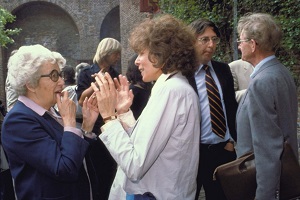
Renate Rubinstein (16 november 1929 – 23 november 1990)
Hier met Annie M. G. Schmidt (links). Rechts van haar Maarten Biesheuvel en Simon Carmiggelt
De Amerikaanse dichter Craig Arnold werd geboren geboren op 16 november 1967 in Temple, Californië. Zie ook alle tags voor Craig Arnold op dit blog.
Incubus (Fragment)
It’s what she doesn’t dream
that scares her, panic she can’t account for, faces
familiar but not known, déjà vu
making a mess of memory, coming to
with a fresh love-bite on her left breast
and the aftershock of granting another’s flesh,
of having gripped, slipped in and fluttered tender
mmm, unbraided, and spent the whole slow day
clutching her thighs to keep the chafe from fading,
and furious at being joyful, less
at the violation, less the danger, than the sense
he’d taken her enjoyment for his own.
That was the time before, the time she swore
would be the last—returning to her senses,
she’d grabbed his throat and hit him around the face
and threw him out, and sat there on the floor
shaking. She hadn’t known how hard it was
to throw a punch without pulling it back.
Now, as they sit together on her couch
with the liquid cooling in the stained chipped cups
that would never match, no matter how hard
she stared at them, he seems the same as ever,
a quiet clumsy self-effacing ghost
with the gray-circled eyes that she once wanted
so badly to defy, that seemed to see her
seeing him—and she has to admit, she’s missed him.
Why? She scrolls back through their conversations,
searching for any reason not to hate him.
She’d ask him, What’s it like being a girl
when you’re not a girl? His answers, when he gave them,
weren’t helpful, so evasively poetic:
It’s like a sponge somebody else is squeezing.
A radio tuned to all stations at once.
Like having skin that’s softer but more thick.
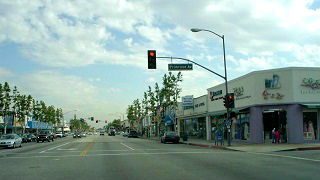
Craig Arnold (16 november 1967 – 27 april 2009)
Temple City, Californië
De Schotse schrijver, humorist, radio-en televisie presentator Daniel Frederick Wallace werd geboren op 16 november 1976 in Dundee. Zie ook alle tags voor Daniel Wallace op dit blog.
Uit: I Can’t Believe You Just Said That
“Of course, these things happen in war. But Omar suddenly found himself in a world in which men would simply stand three feet away and stare at him while saying nothing, and even where terrorists would ‘casually take your phone off charge to charge their own phone’.
Omar expected better of ISIS. He didn’t like how they would be so ‘childish in their dealings and mannerisms’, nor how they would rifle through other people’s property without asking first. They were always invading his space, and they talked far too loudly when he was trying to sleep.
As far as he could tell, they didn’t find their own behaviour rude at all.
We all have our own standards when it comes to rudeness.
* * *
Politeness is extremely important to me, though sometimes I wonder if I set the bar too high.
I feel rude if I sneeze on a plane. I have lost count of the number of times I have apologised to bins or lampposts if I’ve walked into them. If a dog looks my way as I walk through a park, I feel ashamed if I don’t smile or nod a hello. I don’t think I’d last five minutes with ISIS before I’d be straight to Human Resources!
But never was I more aware of my own standards of rudeness than on the day – and immediate aftermath – of what we’ll call ‘the Hotdog Incident’.
All I wanted was a sausage. What I got instead was an afternoon of incredible stress and the desire to do something about it. The desire, as it would turn out, to write this book. Initially I tried to exorcise my demons by composing a scathing 200-word review. But 200 words did nothing. There was too much I still wanted to say – and know. Something that began as a little silly took on a serious edge. What started as a few print-outs left by my bed in London soon became documents in ring-binders arranged in my office.”
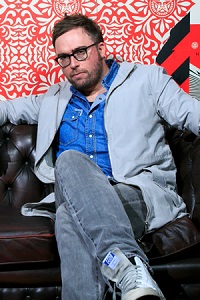
Danny Wallace (Dundee, 16 november 1976)
De Nederlandse literator, kunsthistoricus, archeoloog en katholiek priester Frederik Gerben Louis (Frits) van der Meer werd geboren in Bolsward op 16 november 1904. Zie ook alle tags voor Frits van der Meer op dit blog.
Uit: Jan van Eyck
“Ik kan het niet helpen, maar van de vier Zurbarans te Grenoble, die ik als gymnasiast voor het eerst zag, heb ik alleen het mandje met de eieren, en de wol van de lammetjes onthouden, tot vandaag toe: niet de meesterlijke compositie van De Geboorte met de herders; daarvoor gaf ik toen al vele beroemde stillevens van onze Gouden Eeuw, wellicht ten onrechte. Wat onthield ik, een paar jaar later, van Caravaggio’s meesterstukken in San Luigi dei Francesi in Rome? Natuurlijk het schreeuwend wegrennende jochie, en de louche plunje van de gokkers temidden van wie Mattheus opkijkt naar de onvergetelijke, roepende vinger van Christus. Zelfs bij die surrealist, El Greco, fascineren de details onfeilbaar. Is u soms, van de ondraaglijk gespannen Begrafenis van de graaf van Orgaz, in Toledo, de aurifrisiën van Augustinus’ koorkap vergeten? Het brokaat en de vlaskwasten van Stephanus? Het spiegelen van het zwarte harnas van de dode, de kanten kragen van de zwartgeklede heren? Men hoeft niet af te dalen tot het ‘magisch realisme’ en het feit, dat je het soort tweed herkent in de jas van een onbeduidend, door Willink geconterfeit heer, als duidelijk bewijs voor een dure tailleur, om te ontdekken, dat verbijsterende natuurgetrouwheid een troef is gebleven voor de gewone man. Bij de grote meesters, heet het, zijn dergelijke details niet meer dan afzettrucs binnen een grootse compositie: arabesken verloren op een overdonderende façade. Goed, maar waarom onthoudt u zoiets? Van de hele romeinse wandschilderkunst onthoudt u toch maar de appels uit het huis van Livia en van alle antieke eetkamermozaïeken de befaamde vissen en kwallen, niet die vervelende altijd eendere nimfen en goden. Veertien eeuwen scheiden de banale bravourestukjes van de Romeinse paleisdecorateurs van het revolutionaire oeuvre van Jan van Eyck. Van Eyck is blijkens de traditie beroemd geworden door zijn verbijsterend echte weergave van op zich doodgewone, zij het weelderig natuurlijke of pralend onnatuurlijke details; verder door wat Dr. Dhanens terecht een legende noemt: namelijk dat hij de uitvinder zou zijn van de olieverftechniek, ongeveer zoals de man uit Biervliet die van het haringkaken, een topos, die zelfs door de Italianen eeuwenlang is herhaald.”
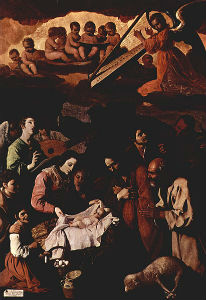
Frits van der Meer (16 november 1904 – 19 juli 1994)
De aanbidding van de herders door Francisco de Zurbarán, 1638
De IJslandse dichter en natuurwetenschapper Jónas Hallgrímsson werd geboren op 16 november 1807 in Öxnadalur. Zie ook alle tags voor Jónas Hallgrímsson op dit blog.
Hell
I find it all a foolish joke,
falling to hell’s abyss of smoke
to sit there, braised and baking,
among the howling fiends of fire,
so far from God’s sunshiny choir —
it sets my soul to quaking!
There squads of skate-winged demons lurk,
skirling through everlasting murk
where ruddy flames hold revel.
All is fire and ice by turns,
everything freezes or it burns,
the dead souls — and the Devil
Tómas’s Meadow
Near towering Tonguehill Glacier
Tómas’s Meadow lies,
the only green oasis
under the desert skies.
Here my dear friend’s horses
hurried once in their need;
never again will he graze them
on his grassy upland mead.
Wide is the Dancing Desert,
distant the weeping sea.
Where sands are sweeping northward
my soul is hurrying me.
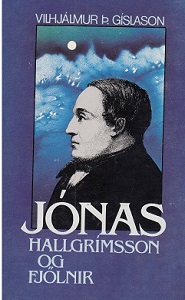
Jónas Hallgrímsson (16 november 1807 – 26 mei 1845)
Cover
De Duitse schrijver, dichter en essayist Hugo Dittberner werd geboren op 16 november 1944 in Gieboldehausen. Zie ook alle tags voor Hugo Dittberner op dit blog.
Uit: Wolken und Vögel und Menschentränen
„Ingrid hatte Moni seit Wochen nicht gesehen. Ein merkwürdiges Erlebnis hatte ihr unendliches Gespräch, wie sie es sich pathetisch versprochen hatten, unterbrochen. Moni hatte sich ein neues und viel komfortableres Telefon gekauft, mit Fax und automatischem Anrufbeantworter. Und sie hatte einen befremdlichen, nur die allernormalsten Floskeln zulassenden Text auf den Beantworter gesprochen, der Art: Hier ist der Anrufbeantworter von Monika Müller, Telefonnummer Soundso. Ich bin leider im Moment nicht erreichbar. Bitte hinterlassen Sie Ihre Nachricht und gege-benenfalls Ihre Nummer. Ich werde zurückrufen. Bitte sprechen Sie nach dem Piepton … Die Therapiestunden und die Gespräche mit Ingrid hatten also nicht viel gefruchtet … Im Ernstfall war Moni wieder Monika Müller aus Hannover. Diese Erkenntnis hatte sie damals, als sie Moni rasch für den nächsten Abend ab-sagen mußte, weil sie einen Termin mit den jungen Müttern über-sehen hatte, so überrascht, daß sie selbst nur stottern konnte, sie wußte nicht mehr, was. Dann mußte dies Stottern oder irgendein nebenher laufendes Signal dazu geführt haben, daß sich Moni nicht bei ihr meldete. Und da auch sie sich nicht meldete und Moni sich auch in den nächsten Tagen und Wochen nicht mel-dete, meldete sich logischerweise niemand, und die unendlichen Gespräche waren erst mal aus. Nun aber, aus heiterem Himmel, war Moni wieder erschienen und saß in Ingrids Wohnzimmersessel und blätterte in den Kunst-bänden, in denen sie immer schon gern geblättert hatte. (Wie der Ministerpräsident sah sie lieber moderne Kunst an als zu lesen.) Cezanne, Monet, van Gogh, Matisse, Twombly. Es lagen einige Bände da, neben jenem Buch über die norddeutsche Backstein-gotik und Goethe in Weimar und Fontanes Wanderungen in der Mark Brandenburg. Ingrids Stehlampenwelt. Da konnte sich Moni natürlich gleich wieder gut einfinden, während In-grid die Bratäpfel und den Kakao zubereitete. Durch die offen-stehende Tür und über den Flur riefen sie sich die Kürzel zu, die an frühere Gespräche und Wahrheiten erinnerten: Cezannes Rot, immer ein Scheunentor, die Ungelenkheit der Meister (woher ja der Eindruck der Materialität rührte), Matisses Minimalismus: Nur das Nötigste, das aber als zauberhafte Gebärde, aus dem Zentrum heraus, die roten Backsteinkirchen sind unsere Heimat. Mehr als alles andere! Im Zeitalter ohne Denkmäler. Wunderschön die Seerosen! Man möchte langsam zu ihnen waten, vom Rand her sich nähern, um schließlich mittendrin zu sein … Manchmal kam Ingrid an die Tür, damit sie nicht so schreien mußten. Und schließlich waren die Taten vollbracht: es gab die Bratäpfel, es gab den Kakao, und es gab den Duft um sie herum.“
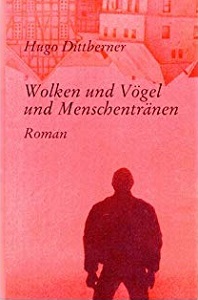
Hugo Dittberner (Gieboldehausen, 16 november 1944)
Cover
Zie voor nog meer schrijvers van de 16e november ook mijn blog van 16 november 2014 deel 2.

